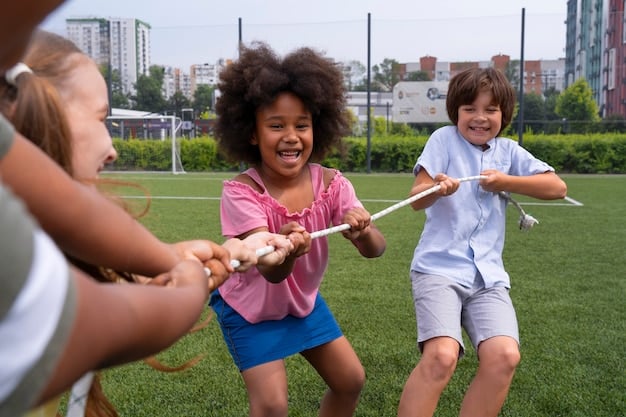Supporting Young Athletes: A Parent’s Guide to Encouragement Without Pressure

Supporting children’s athletic development involves creating a positive environment that encourages effort and enjoyment, rather than focusing solely on winning, to avoid over-pressuring them and fostering a lifelong love for sports.
Navigating the world of youth sports can be tricky for parents. While support is essential for a child’s athletic development, over-pressure can lead to burnout and a negative experience. So, how can parents support their children’s athletic development without over-pressuring them? Let’s explore practical strategies to strike the right balance, fostering a love for sports and helping young athletes thrive.
Understanding the Impact of Parental Pressure
Parental involvement plays a crucial role in shaping a child’s athletic journey. However, the line between supportive encouragement and detrimental pressure can often blur. Understanding the potential impact of parental pressure is the first step towards fostering a healthy athletic environment.
Negative Consequences of Over-Pressure
When parents place excessive emphasis on winning and performance, young athletes may experience a range of negative consequences. These can extend beyond the field and impact their overall well-being.
- Burnout and loss of interest: Constant pressure can extinguish the initial passion for the sport.
- Increased anxiety and stress: The fear of failure can lead to anxiety, affecting performance and mental health.
- Damaged self-esteem: Linking self-worth to athletic achievements can negatively impact a child’s confidence.
- Impaired relationships with parents: Over-pressure can strain the parent-child bond, creating resentment and distance.
Positive Aspects of Parental Support
Conversely, positive parental support can significantly enhance a child’s athletic experience. When parents prioritize effort, enjoyment, and personal growth, young athletes are more likely to thrive.
- Increased motivation and confidence: Encouragement fosters a belief in their abilities and a desire to improve.
- Enhanced enjoyment of the sport: A supportive environment allows children to experience the joy of competition and teamwork.
- Stronger parent-child relationship: Positive involvement strengthens the bond and creates a foundation of trust.
- Development of life skills: Sports provide valuable lessons in discipline, perseverance, and resilience, which are enhanced by supportive parenting.
Understanding the delicate balance between support and pressure is critical. Parents must be mindful of their words and actions, ensuring they foster a love for the sport rather than creating undue stress.
Setting Realistic Expectations
One of the most important ways parents can support their children’s athletic development without over-pressing them is by setting realistic expectations. This involves understanding their child’s abilities, limitations, and personal goals.
Assessing Skill Level and Potential
It’s crucial for parents to have an honest assessment of their child’s current skill level and potential. This doesn’t mean limiting their dreams, but rather aligning expectations with reality to prevent disappointment and frustration.
Focusing on Effort and Improvement
Instead of fixating on outcomes, parents should emphasize effort and personal improvement. Celebrating small victories and acknowledging hard work can boost a child’s confidence and motivation.

Communicating Openly with Your Child
Open communication is key to understanding your child’s perspective and goals. Engage in regular conversations about their athletic experiences, listening attentively and offering guidance without imposing your own agenda.
Setting realistic expectations is not about lowering the bar; it’s about creating an environment where children can strive for their personal best without feeling overwhelmed by unrealistic demands.
Creating a Positive and Supportive Environment
The environment surrounding a young athlete can significantly impact their experience. Creating a positive and supportive atmosphere is crucial for fostering a love for the sport and preventing over-pressure.
Emphasizing Fun and Enjoyment
Remember that youth sports should be primarily about having fun and enjoying the experience. Encourage your child to focus on the joy of playing, rather than solely on winning.
Being a Positive Role Model
Parents serve as powerful role models for their children. Demonstrate positive behavior, such as good sportsmanship, respect for coaches and teammates, and a healthy attitude towards competition.
Attending Games and Practices
Attending games and practices shows your child that you value their efforts and are invested in their athletic journey. However, avoid being overly critical or providing unsolicited advice during these events.
Creating a positive and supportive environment involves fostering a sense of belonging, encouraging teamwork, and celebrating both individual and collective achievements. It’s about making the athletic experience enjoyable and rewarding for your child.
Effective Communication Strategies
Communication is a cornerstone of any healthy relationship, and it plays a vital role in supporting a child’s athletic development. Effective communication strategies can help parents foster understanding, build trust, and prevent over-pressure.
Active Listening
Active listening involves paying close attention to what your child is saying, both verbally and nonverbally. Show genuine interest, ask clarifying questions, and avoid interrupting or judging.
Providing Constructive Feedback
When offering feedback, focus on specific behaviors and actions rather than making general criticisms. Frame your comments in a positive and encouraging tone, emphasizing areas for improvement.

Avoiding Criticism and Nagging
Constant criticism and nagging can erode a child’s confidence and motivation. Instead of focusing on mistakes, celebrate successes and provide gentle guidance.
Effective communication is about creating a safe space where children feel comfortable sharing their thoughts, feelings, and concerns. It’s about fostering a partnership based on mutual respect and understanding.
Promoting a Healthy Balance
Athletics should be a part of a well-rounded life, not the sole focus. Promoting a healthy balance between sports and other activities is crucial for preventing burnout and fostering overall well-being.
Encouraging Other Interests
Support your child’s exploration of other interests, such as academics, arts, and hobbies. This helps them develop a diverse skill set and prevents them from defining themselves solely by their athletic abilities.
Prioritizing Academic Success
Emphasize the importance of academic success, ensuring that sports don’t overshadow their education. Help them develop effective time management skills to balance both commitments.
Ensuring Adequate Rest and Recovery
Adequate rest and recovery are essential for preventing injuries and promoting optimal performance. Encourage your child to prioritize sleep, nutrition, and relaxation.
Promoting a healthy balance is about helping children develop a holistic sense of self, where their athletic pursuits are integrated into a broader framework of personal growth and well-being.
Recognizing the Signs of Over-Pressure
It’s important for parents to be vigilant in recognizing the signs of over-pressure. Early detection can allow for timely intervention and prevent negative consequences.
Changes in Behavior
Pay attention to changes in your child’s behavior, such as increased irritability, withdrawal from social activities, or a decline in academic performance.
Physical Symptoms
Be aware of physical symptoms such as headaches, stomachaches, or fatigue, which can be signs of stress and anxiety.
Verbal Cues
Listen for verbal cues such as expressing a lack of enjoyment in the sport, complaining about pressure, or expressing a fear of failure.
Recognizing the signs of over-pressure is about being attuned to your child’s emotional and physical well-being. It’s about being willing to adjust your approach and prioritize their overall health and happiness over athletic achievements.
| Key Point 🔑 | Brief Description 📝 |
|---|---|
| Realistic Expectations 🎯 | Align expectations with abilities, focusing on effort and improvement. |
| Positive Environment 😊 | Emphasize fun, be a role model, and attend events supportively. |
| Effective Communication 🗣️ | Listen actively, give constructive feedback, and avoid criticism. |
| Healthy Balance ⚖️ | Encourage other interests, prioritize academics, and ensure rest. |
Frequently Asked Questions
▼
Look for signs like increased anxiety, loss of interest in the sport, or physical symptoms like headaches. Also, listen to their verbal cues about feeling pressured.
▼
Focus on their effort and personal improvement, rather than comparing them to others. Celebrate their progress, no matter how small.
▼
While competition is a part of sports, the primary focus should be on having fun, developing skills, and learning valuable life lessons. Winning should be secondary.
▼
Have an open conversation about their reasons for wanting to quit. If they’re truly unhappy, supporting their decision to explore other activities may be the best course.
▼
Emphasize that setbacks are a normal part of sports and life. Help them reframe losses as learning opportunities and encourage them to persevere.
Conclusion
Supporting your child’s athletic development is a delicate balancing act. By setting realistic expectations, creating a positive environment, communicating effectively, promoting a healthy balance, and recognizing the signs of over-pressure, parents can help their young athletes thrive and develop a lifelong love for sports.





